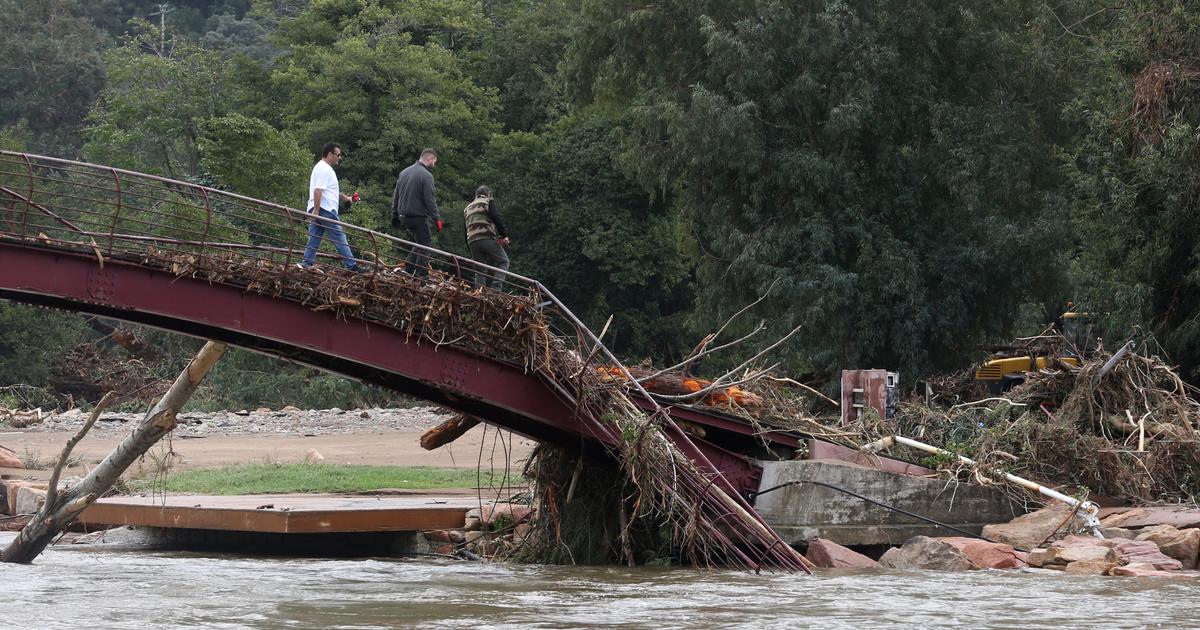UN climate summit Madrid
all articles
Now it is over, the Madrid climate conference. Most of the approximately 26,000 participants left the exhibition center long ago and did not have to take part in the extension marathon at the end. Around the conference venue, on posters and in the corridors of the underground station, the event motto is emblazoned: "Time For Action".
But this summit missed its subject.
After thirteen and a half days of negotiations and two supervised extra nights, the emissaries of almost 200 countries have at least agreed on a joint final declaration. Otherwise this summit would have failed completely. The climate economist Reimund Schwarze from the Helmholtz Center for Environmental Research calls this "communiqué" a purely cosmetic solution: "Preventing regressions is not progress". And virtually nothing has preceded climate protection.
Chaotic scenes took place in the final plenary. Chilean summit president Carolina Schmidt confused documents that were to be voted on. One technical problem follows the next: for a short time, delegates could not even access the website, where the decisions should be. For a few minutes, it looked like Brazil was torpedoing the final statement at the last moment. Then the Brazilians gave in; the delegates approved the minimal compromise. The applause lasted less than ten seconds.
It became embarrassing towards the end. A possible decision about long-term climate finance after a communicative glitch burst: in the final plenary session, the overnight delegates noticed that two different versions of the document, which they were supposed to vote on, were circulating among them.
"A 'climate conference of action' without agreement on climate finance is a climate conference of inaction," said the Maldives delegate. President Schmidt had to tolerate the topic at the next 2020 summit in Glasgow. A disappointment, she said in a choked voice. She almost burst into tears.
"A climate conference of inaction"
Never before has a climate conference overdrawn the schedule like this by more than 40 hours. There was hardly any action on climate protection from the states. Exception: the EU. She rushed ahead on Wednesday with her ambitious "Green Deal". But nobody followed her. A striking number of nations committed to doing more for the climate in the future.
It is clear to everyone that global emissions are increasing, from record to record. Heat waves are piling up, the jet stream is weakening. And the international community's previous promises amount to a warming of around 3 degrees Celsius. This is well above the 1.5 to 2 degrees that they praised in the Paris climate agreement. Among other things, plus 3 degrees could trigger that the sea level rises by several meters.
With difficulty and hardship, the EU negotiated in the final declaration an indirect warning to the states to submit more ambitious national climate protection plans before the next summit. A previous version had succinctly asked states to submit strategies to Glasgow in line with Paris' climate targets. Now it is announced in the announcement that the conference emphasizes "with serious concern" that the "substantial gap between the efforts of the states to reduce emissions" and the Paris climate goals must be "urgently" addressed and that "increased ambition" is now required. But diplomatically sophisticated words will not save the planet.
"We have the skills, we have the technology, we have the science behind us, we even have the capital" for the transformation to a low-carbon economy, says EU Vice President Frans Timmermans. "But we have to get started. We have no time to waste."
Right-wing populists and coal fans are slowing down the world
Other governments take all the time in the world. Brazil, Australia and even the United States - which will step out of the climate treaty in November - slowed the negotiations as hard as possible. No wonder: all three countries are governed by right-wing populists and self-declared coal fans.
The polarization manifested itself several times in Madrid: for example in the dispute over a new market for emission certificates. It should enable states that do not fully achieve their CO2 targets on their own to neutralize their greenhouse gas balance: by purchasing certificates that are created through climate protection projects in other countries. This project must now be postponed. Because the states were unable to agree.
Brazil and Australia tried again and again to install loopholes. For masses of ancient certificates, for example, which they had left over from previous trading systems and now wanted to sell. That would have brought them a lot of money - but harmed the planet. Despite unchanged climate targets, issuers could have blown hundreds of millions more tons of CO2 into the atmosphere.
The Europeans and particularly vulnerable states such as the Pacific Island nations did not want to allow this to happen. The parties to the conflict blocked each other until the end. Result: next year in Glasgow they have the conflict on the negotiating table again.
You can't do without China
China showed no concrete ambitions for more climate protection. Again and again emissaries of the world's largest CO2 emitter praised their country for fulfilling its not too strict climate plan. They were less happy to talk about the fact that coal power generation and CO2 emissions in the People's Republic will increase again this year. Apparently, the communist regime is ramping up heavy industry: to fuel growth that is suffering from the trade war with the United States.
"China has warned western countries that they have recently done too little about climate protection," says BUND boss Bandt. "But if other countries set ambitious goals and involve the Chinese, they may join in." Now it is up to the federal government. She will take over the EU Council Presidency next summer and host the EU-China summit in Leipzig in September. "It is extremely important to involve the Chinese," says climate economist Schwartze. "Without them, the Europeans will not be able to get anything done again at the Glasgow summit."
With the Green Deal, the EU has taken on a pioneering role in global climate policy. But not the leading role. On the contrary: allies are lost.
Germany must go ahead
Many EU member states, including Germany, are still completely unclear on how exactly they can achieve the stricter CO2 targets. The Federal Government will have to translate the still vague Green Deal into concrete policies and massively reduce Germans' emissions - especially in traffic. Flying and driving have to become more expensive. That will cause conflict.
The young climate protection movement, however, is not going fast enough. As many people put her on the streets this year, so little did she do in Madrid. The conference was a flop in the eyes of the activists. "Even though it was only about a little, not even that was achieved. We saw nothing but stagnation," says Jakob Blasel from Fridays For Future Germany.
"The international community did not deliver," says Helmholtz researcher Schwarze: "In fact, not a single ton of CO2 has been moved here. This will disappoint many young people who have demonstrated peacefully for climate protection for months." Now it could be "that this disappointment radicalizes."
At the Madrid summit, a few hundred accredited activists were already clearing their frustration. They went to the plenary hall unannounced on Wednesday, demanding action instead of empty words, drumming with wooden forks on glass bottles. The noise was even heard inside the Blessed Sacrament - to the indignation of some delegates. Finally, security men encircled the rioters, rudely carried them out of the exhibition halls and did not let them back in for the rest of the day.
Sure: the activists did not adhere to the conference rules. But at least they did some action in Madrid.









